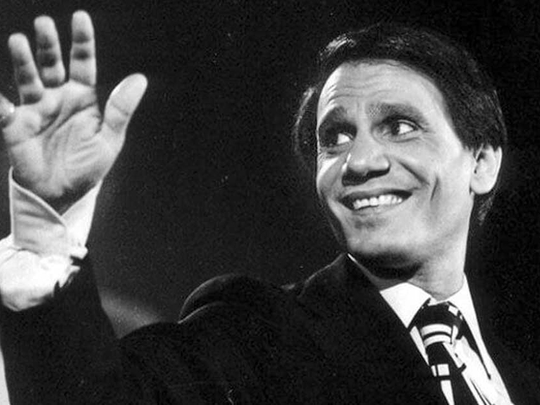
“Tell Him, Tell Him... The Truth”, the famous song of Abdul Halim Hafez plays on the old radio of the ‘Nightingale’ coffee shop in downtown Cairo, a place named after the nickname of Abdul Halim Hafez where the walls are plastered with black and white photographs of the legendary Egyptian singer.
“He reminds me of my youth, he reminds me of times when Egypt was beauty, elegance, class and tranquility,” says Essam Al Sayyed, a 63-year-old man sipping his tea at the small coffee shop.
Al Sayyed’s opinion of ‘Al Andleeb Al Asmar’, or the ‘dark-skinned nightingale’ — the famous nickname of Abdul Halim — is shared by many Egyptians of his generation who grew up on the tunes of Abdul Halim playing out in the balconies and alleys all over Egypt.
Abdul Halim is considered to be the voice that epitomised Egypt’s cultural renaissance in the 1950s and 1960s. He is regarded as the Frank Sinatra of Egypt, a description betowed on him by his friend and collaborator, poet Abdul Rahman Al Abnoudi.
“My children, grandchildren and all generations to come will sing [his songs] forever,” says Al Sayyed while looking at a shiny photograph from one of Abdul Halim’s movies.
This statement, however, is only partially true since Amir Allam, a teenager residing in the same neighbourhood, expressed his ‘frustration’ with the lengthy songs of Hafez, “It is somehow monotone and very long with repeated verses,” Allam told Weekend Review, adding that he liked “more fast-paced tunes, the more modern melodies in general.”
Since Allam does not have a direct memory of Abdul Halim, he’s only familiar with songs that his parents played on their car stereos.
Abdul Halim Hafez’s melodies still linger in the background on the streets of Egypt, alluding to a glorious past when Egyptians felt proud of their present and were hopeful for their future.
Abdul Halim ‘innovated’ a completely new style in music, according to music historian Dr Said Zine Nassar, a professor of music at the Higher Art Academy. “It was challenging for this slim young man to make it big in the world of musical giants like Umm Kulthum, Abdul Wahab and others. In the early days of his career, Abdul Halim was rejected for his new style of singing as he innovated a faster tempo, braver and more romantic tunes that gained him accolades and enormous success.”
“His music lives on. It is still played all over the Arab world on a daily basis,” Nasser added.
That is true as loyal fans of “Al Andleeb” can still tune in to three hours dedicated to Hafez on Egyptian radio stations, including three fixed slots at 7pm, 9pm and 11pm on three radio stations.
Radio played a big role in making him a national and regional hero. When Hafez Abdul Wahab, the supervisor of musical programming at Egyptian national radio, offered Abdul Halim Ali Shabana his first live radio performance, Abdul Halim adopted ‘Hafez’, Abdul Wahab’s first name, as his stage-surname as a tribute to his patronage.
Not many new generation artists perform cover versions of Hafez’s songs but concerts dedicated to Hafez are always fully booked. Recently, the Cairo Opera House held a series of concerts for almost two months, giving new singers an opportunity to appreciate the music of Abdul Halim Hafez. Several young contestants found fame and support in pan-Arab talent shows for performing cover versions of Hafez songs.
“We hold a Hafez cover concert [once a week], and it is full every time, from all generations and walks of life,” the Opera House said.
“I love Halim. Whenever I listened to him [in my younger days], my family would know I was feeling emotional,” Sarah Anaany, 42, said.
“I think we are the generation that got squeezed in the middle. We lived through the echoing hype of Halim from previous generations and before the hype of newer singers,” says Anaany, who is a mother of two.
A series of shows with marionettes and puppets presented at El Sawy Culture Wheel — a private cultural centre located on Gezira Island in the Zamalek district of central Cairo — were based on the life and music of Abdul Halim Hafez to introduce the great singer to a younger generation.
Orphaned at an early age, Hafez struggled in his early years, working as a music teacher at a girls’ public school in Tanta following his graduation from the Art Academy. His popular love songs and movie roles as the romantic lover made Abdul Halim a special favourite of women and girls in Egypt and the region. He died of liver failure in the spring of 1977 (a few months shy of his 48th birthday) while undergoing treatment in King’s College Hospital, London. His funeral in Cairo was the biggest in the Middle East with millions marching on the streets of the Egyptian capital. Reportedly, four women killed themselves by jumping off the balcony during his funeral march.
However, Abdul Halim who acted in 16 films, was never satisfied with romantic roles and tried to touch upon social issues in his films. His music also touched upon class divisions in society, patriotic songs and songs of war and revolutions.
He released patriotic songs in the 1950s and 1960s, most of them revolving around a common theme — often about “the leader”, who in this case was the then President Jamal Abdul Nasser, and the people who would jointly overcome obstacles and achieve victory.
His songs reflected the political environment at the time in Egypt and reflected national dreams and visions. He was a friend to Nasser who called him ‘the son of the revolution (1952)’.
“Halim’s patriotic songs offer three key themes: victory, defeat and resistance. How you listen to them really depends on where you stand. But for sure, they were no mere propaganda songs,” Amr Khafaguie, a commentator and talk show host said.
“He believed in every word he sang, which was reflected in his passion. He promoted the values of the 1952 revolution at times of victory and defeat alike. So when we listened to songs like ‘I Swear’, we believed him,” Abdul Rahman Al Abnoudi, the late Egyptian poet once said.
Al Abnoudi tried to counter claims that Abdul Halim’s songs were more or less an orchestrated propaganda for Nasser’s regime.
“Abdul Halim Hafez performed his role not merely as a singer but rather as a participant in formulating political events of the Arab nation,” cites the Egyptian official State Information Service Web portal.
The patriotic songs of the ‘dark-skinned nightingale’ are used by Egyptians to draw a parallel with the current political situation in the country. “It was unavoidable. This is where the public mood is today. I could not escape it,” Khafaguie said about his show on Abdul Halim’s anniversary.
Abdul Halim couldn’t have imagined that his songs would become the voice of another revolution after more than a half century. His music was played in Tahrir Square during the 2011 revolution, especially the song ‘Sura’ or ‘Picture’ which was almost the anthem of the revolution that toppled a semi-military regime.
In his lifetime, Abdul Halim Hafez recorded more than 300 songs, produced many of them himself as he was the co-founder of the famous Egyptian recording company Soutelphan which operates as a subsidiary of EMI Arabia today.
Abdul Halim’s fame echoed beyond Egypt as he held concerts in almost every Arab country and occasionally sang in Europe, including on the stage of the Royal Albert Hall, where Abdul Halim received one of the greatest ovations of his career singing after the Egyptian setback in 1967.
Many Egyptians feel particularly proud of Abdul Halim Hafez’s popularity in the Arab world, claiming that the Egyptian accent is widely popular in the region partially due to the songs of Abdul Halim who performed in almost every country in the Arab world such as Lebanon, Syria, Tunisia, Algeria and Morocco.
Abdul Halim Hafez also became friends with some Arab leaders such as the late Tunisian President Habib Bourguiba and King Hassan II of Morocco.
“He could have sung away any rift in the relations between Egypt and any Arab country. I even remember pictures of Abdul Halim at almost all Arab capitals,” says Nadia Farid, a retired teacher while hinting at the current possible rift between Egypt and some Arab countries.
Abdul Halim Hafez’s song Khosara Khosara, which was composed by Baligh Hamdy, hit international headlines when Hamdy’s heir sued Jay Z and his producer Timbaland in 2007 claiming that the song was used as the backing track for Big Pimpin’ without the proper licences.
Although the lawsuit was abruptly dismissed by a US court in October last year, it proved the rich appeal of Andul Halim Hafez’s music across cultures and borders.
With millions listening to his music on a daily basis, there is no doubt that Abdul Halim Hafez is considered to be one of the great four of Arabic music, along with Umm Kulthum, Mohammad Abdul Wahab and Farid Al Attrach.
For many of Egyptians who lived during his era or were introduced to his music later, Abdul Halim remains a legend who gave his voice to a different Egypt, a more dreamy one.
Raghda El Halawany is a writer based in Cairo.











